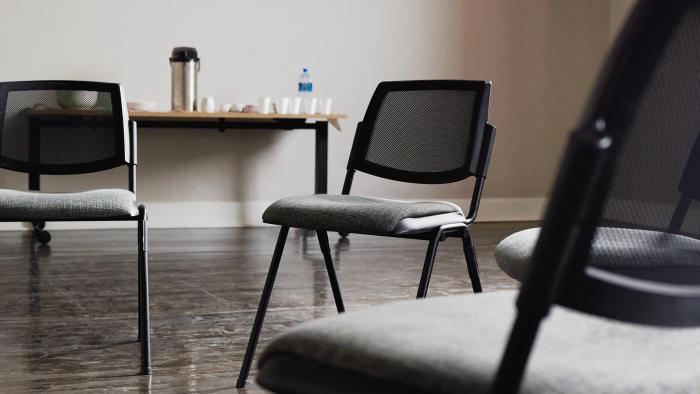$2M Grant to Help Give Patients With Substance Use Disorders a Voice
UMD Experts and Colleagues Will Assemble, Consult Committee of Marylanders in Recovery
From South Africa to Baltimore to the Eastern Shore of Maryland, psychology researcher Jessica Magidson has spent much of her career studying the struggles of individuals with substance use disorders and devising ways to aid in their recovery.
Now, with more than $2 million in support from the National Institute on Drug Abuse (NIDA), the MPower Professor and director of the Center for Substance Use, Addiction and Health Research (CESAR) is joining with colleagues to give those in recovery a stronger voice in shaping research on substance use.
Focusing on several counties hard-hit by the opioid use epidemic in Western Maryland and the Eastern Shore, Magidson and co-principal investigator Sarah Kattakuzhy, an associate professor of psychiatry at the University of Maryland School of Medicine (UMSOM), will recruit 15 Marylanders from rural areas to join a “patient advisory committee” that will guide the grant’s research efforts.
“People with substance use disorders are often neglected by the research process, and even more so when they live in rural communities,” Magidson said. “This project will hopefully become a national model for consultation for other experts conducting research in this space.”
The researchers—including CESAR Deputy Director of Policy Erin Artigiani, and Associate Professor of Psychiatry Eric Weintraub, Associate Professor of Family and Community Health Marik Moen, and School of Social Work Professor Jodi Frey from UMSOM, located at the University of Maryland, Baltimore—will work with committee members to understand what programs currently are available for individuals with substance use disorder, and where they may be falling short.
Andrea López, an associate professor in the Department of Anthropology, will lend her interviewing and observational expertise to this portion of the project.
“Mixed methods and interdisciplinary approaches only strengthen our ability to understand complex social issues,” López said. “By bringing in methods from medical anthropology, we expand our commitment to understanding the structural, social and environmental factors that impact marginalized populations in everyday contexts.”
Firsthand insights from patients are incredibly valuable to studies of substance use, the researchers say, as the road to recovery often isn’t linear, and patients’ histories with drug use can be complex.
“All of the research that we've done really underscores how many kinds of drugs people can be exposed to,” explained Artigiani. “What they're exposed to—and whether they knew they were taking those kinds of drugs, or they were inadvertently exposed to them—can have a big impact on what kind of services they need, what kind of treatment might be most effective for them, and what kind of ongoing support they may need in their recovery.”
CESAR has already had insight into what this “polysubstance use” phenomenon looks like in rural areas. Magidson and Kattakuzhy have been leading a peer-based study using mobile treatment units in Caroline County for nearly two years, and Artigiani is a co-investigator on a project that collects anonymized electronic health record data and retests patient urine specimens for a variety of substances.
“These rural communities are getting hit really, really hard by polysubstance use—it's not just opioids; it's opioids, methamphetamine, alcohol and other substances;” Magidson said. “We find that services are even more fragmented or poorly coordinated when people are seeking services for multiple substance use disorders.”
Finding and testing new ways to address these issues are the final aims of the study, and again, the patient advisory committee will play a substantial role. While the researchers have ideas about pilot programs worth investigating, whether and how they do so will be informed by those most familiar with the issue: the patients.
“The best medications and treatments can be developed, but if people don't use them, they're not going to be effective,” said Magidson. “We need to talk to people who are actually living with these conditions to understand what will help them actually utilize services and maintain long-term recovery.”
This article by Rachael Grahame originally appeared in Maryland Today. The photo is by iStock.
Published on Fri, Aug 9, 2024 - 11:20AM




